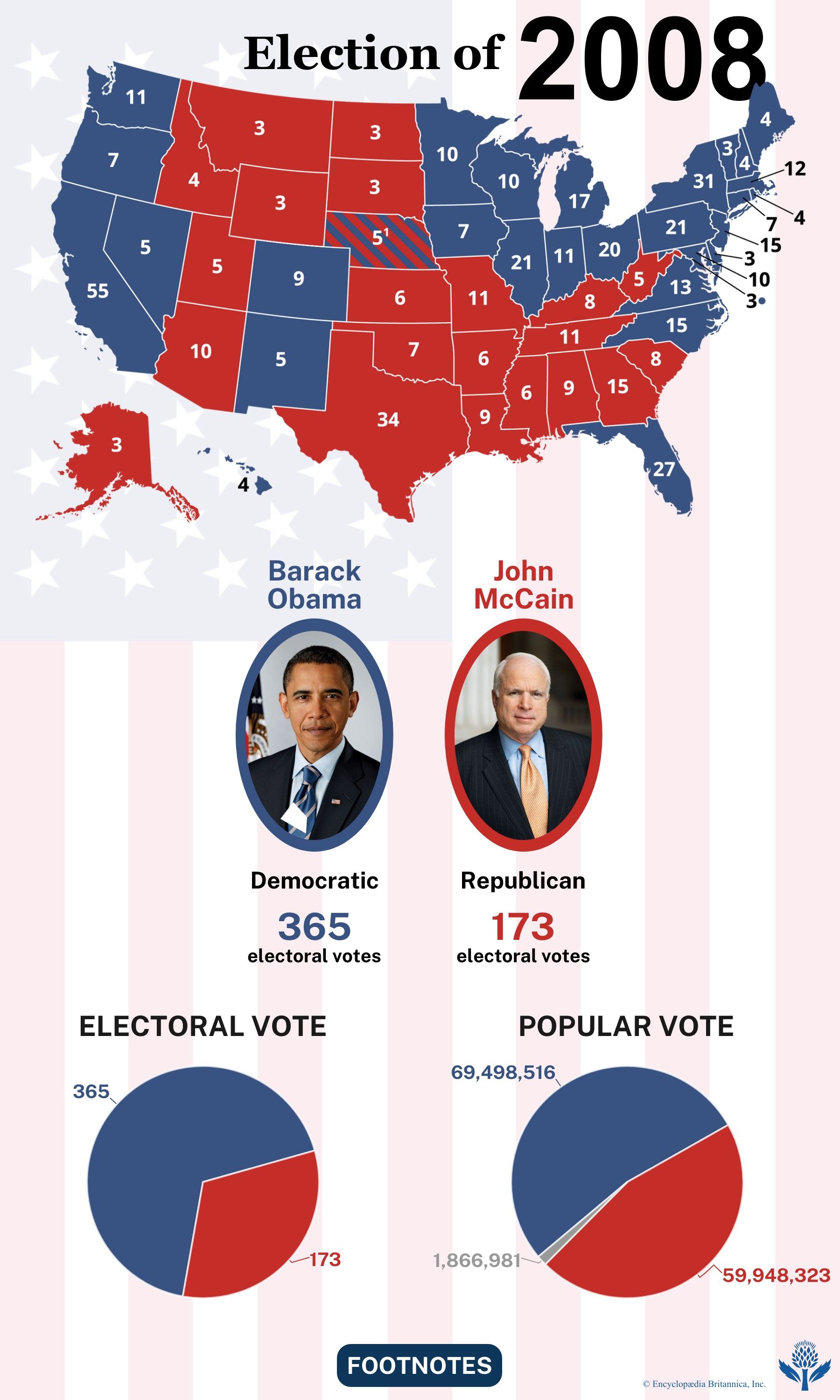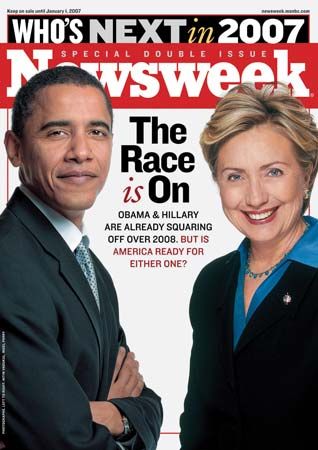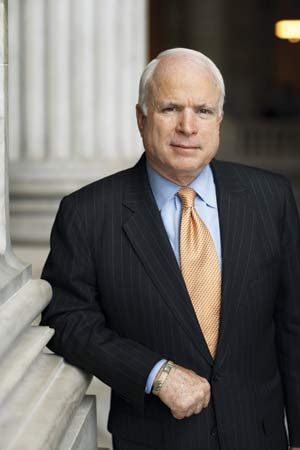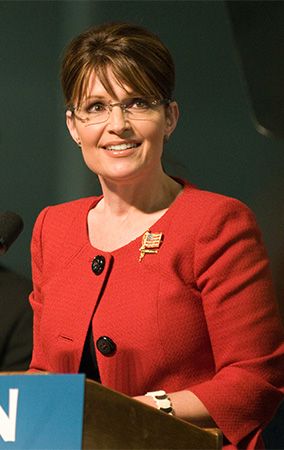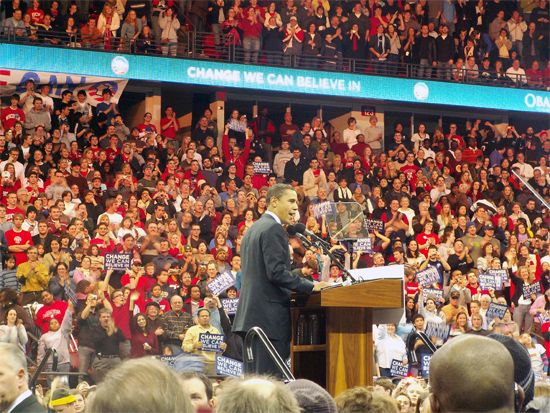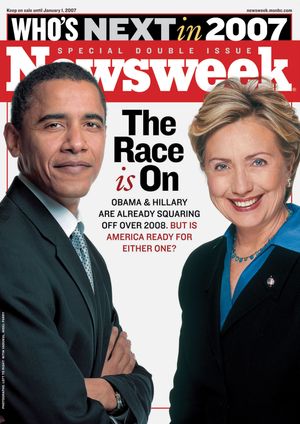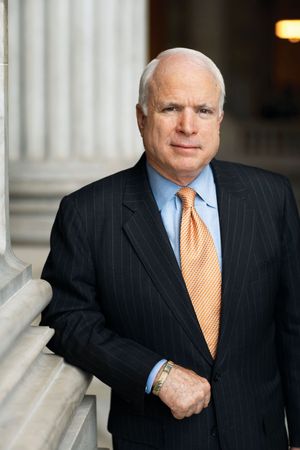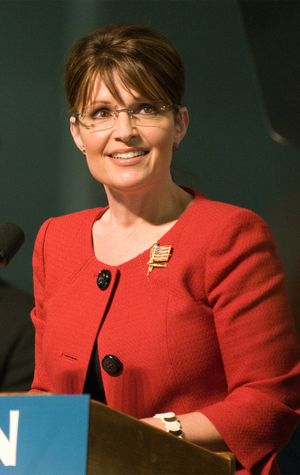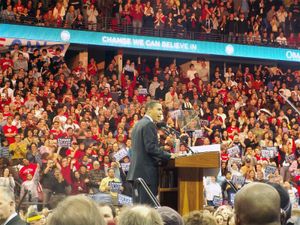United States presidential election of 2008
- Date:
- November 4, 2008
American presidential election held on November 4, 2008, in which, after a campaign that lasted nearly two years, Americans elected Democrat Barack Obama their 44th president. The result was historic, as Obama, a first-term U.S. senator from Illinois, became, when he was inaugurated on January 20, 2009, the country’s first African American president. He also was the first sitting U.S. senator to win election to the presidency since John F. Kennedy in 1960. With the highest voter turnout rate in four decades, Obama and Delaware senator Joe Biden defeated the Republican ticket of Arizona senator John McCain, who sought to become the oldest person elected president to a first term in U.S. history, and Alaska governor Sarah Palin, who attempted to become the first woman vice president in the country’s history.
At a glance: the election of 2008
The campaign
Primary campaign
The 2008 primary campaign was historic. On the Democratic side, the field narrowed quickly to pit Barack Obama against Hillary Clinton. Both candidates were seeking to become presidential “firsts”—Obama the first African American president and Clinton the first woman president. A sometimes bitter contest between Obama and Clinton produced the narrowest of victories for Obama.
Read about other presidential elections that changed the course of history.
The Republican campaign produced a surprising winner, John McCain. Many pundits had written off McCain during the summer of 2007, as his campaign was faltering, while many others had anointed Rudy Giuliani as the front-runner. But Giuliani failed to capture a single state in the primaries, and McCain went on to defeat strong challenges from Mitt Romney and Mike Huckabee easily.
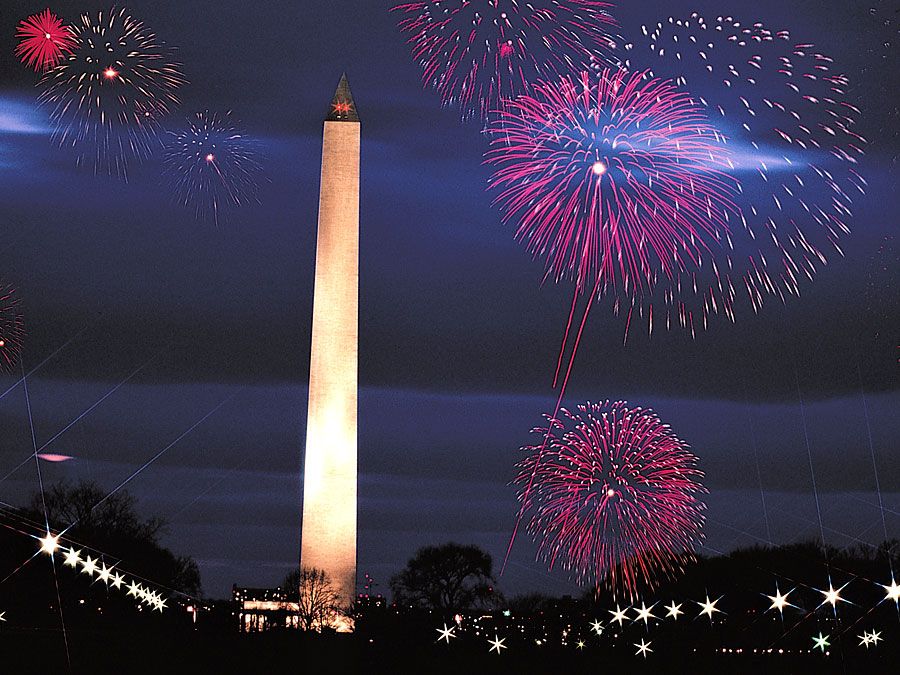
General campaign
The 24/7 news cycle and the proliferation of blogs as a means of disseminating information (both factual and erroneous) framed the contest as both campaigns attempted to control the narrative. McCain’s campaign tried to paint Obama as a naive, inexperienced political lightweight who would sit down with the leaders of anti-American regimes in Cuba, Iran, and Venezuela without preconditions, claimed that he was merely a celebrity with little substance (airing an ad comparing Obama to Britney Spears and Paris Hilton), labeled his ideas socialist (hammering away at Obama’s tax policy in particular and pouncing on Obama’s comment to “Joe the Plumber” that he would seek “spread the wealth”), and attacked his association with Bill Ayers, who had cofounded the Weathermen, a group that carried out bombings in the 1960s. Ayers, in 2008 a professor at the University of Illinois at Chicago—and constantly called an “unrepentant domestic terrorist” by the McCain campaign—lived a few blocks from Obama in Chicago, contributed to his reelection campaign for the Illinois Senate, and served on an antipoverty board with Obama from 1999 to 2002. Obama downplayed his acquaintance with Ayers and denounced Ayers’s activities as “detestable” but was quick to note that these activities had occurred 40 years ago when the candidate was eight years old.
In addition, on the basis of e-mails and other assertions never proved, a small but still significant percentage of the public erroneously believed Obama (a practicing Christian) to be a Muslim. To defend against the attacks, Obama’s campaign took the unprecedented step of establishing a Web site, “Fight the Smears,” to “fight back against ‘hateful,’ ‘vicious,’ and ‘desperate’ robocalls and mailers.” In turn, Obama’s campaign attempted to cast doubt on McCain’s maverick persona and diminish his appeal to independent voters by tying him at every opportunity to Pres. George W. Bush, whose popularity was among the lowest of any modern president, and broadcasting ads that showed the two in embrace and often repeating that McCain voted with the Bush administration 90 percent of the time. The Obama campaign also sought to frame McCain as “erratic,” a charge that was often repeated and that some alleged was an oblique reference to McCain’s age, as he would be the oldest person ever to be inaugurated to a first term as president.
The fall campaign was also conducted against the backdrop of a financial crisis that gripped the country in September, when world markets suffered heavy losses, severely hitting the retirement savings of many Americans and pushing the economy to the top of voters’ concerns, far outdistancing the war in Iraq and the war on terrorism. From September 19 to October 10, the Dow Jones Industrial Average dropped 26 percent, from 11,388 to 8,451. At the same time, there was a severe contraction of liquidity in credit markets worldwide, caused in part by the subprime mortgage crisis, which resulted in the U.S. government’s providing emergency loans to several American firms and the bankruptcy or sale of several major financial institutions. The U.S. economic and political establishment reacted by passing (after an unsuccessful first attempt) the Emergency Economic Stabilization Act, which sought to prevent further collapse and to bailout the economy.
The effect of the economic crisis was dramatic, turning a small McCain-Palin lead in the polls in early September into a steady Obama-Biden lead. Obama’s lead was further supported by his performance in the three presidential debates, with polls indicating that he was the winner of all three. In both the debates and his response to the financial crisis, Obama scored points with the public for his steadiness and coolness (characterized as aloofness by his critics). Whereas McCain announced the suspension of his campaign for a few days in September to return to Washington, D.C., to address the financial crisis and suggested that the first debate be postponed, Obama played more of a behind-the-scenes role and insisted that the debate take place, saying, “It is going to be part of the president’s job to deal with more than one thing at once.”
Obama was also aided by his decision to opt out of the federal financing system, which would have limited his campaign to $84 million in spending. The McCain campaign criticized this decision, citing a questionnaire Obama filled out in 2007 in which he pledged to stay within the public financing system; however, Obama defended the decision, arguing that in the same document he called for a plan that would require “both major party candidates to agree on a fundraising truce, return excess money from donors, and stay within the public financing system for the general election” and that if he won the Democratic nomination he would “aggressively pursue an agreement with the Republican nominee to preserve a publicly financed general election.” The Obama campaign’s decision paid off, as it attracted more than three million donors and raised an astounding $150 million in the month of September alone, enabling the campaign to outspend the McCain campaign by significant margins in the battleground states and to purchase 30 minutes of prime-time television six days prior to the election (more than 33 million Americans watched the Obama infomercial).
The campaign generated enormous enthusiasm, with millions of new registrants joining the voting rolls (though the McCain campaign alleged that many of these were registered illegally, after allegations surfaced that several employees hired by ACORN, an interest group that lobbies on behalf of lower-income families, had submitted falsified registrations). McCain hosted numerous town hall meetings (a format in which he excelled) throughout the country, in which attendees could question the candidate; however, some of these meetings came under media scrutiny when some audience members became heated in their criticism of Obama. Obama rallies consistently attracted large crowds—including some 100,000 at a rally in St. Louis, Missouri, in mid-October—and tens of thousands often came out to see Palin on the stump (the campaign had provided only limited access to Palin for the media). Although some commentators, including conservative ones, questioned her readiness for the vice presidency and presidency, she proved enormously popular: a record 70 million Americans tuned into the vice presidential debate, and her appearance on Saturday Night Live, whose Tina Fey had lampooned her several times previously, drew the show’s highest ratings for 14 years.
Obama won the general election by a wide electoral margin, capturing 365 electoral votes and nearly 53 percent of the popular vote. Not only did he hold all the states that John Kerry had won in the 2004 election, but he also captured a number of states (e.g., Colorado, Florida, Nevada, Ohio, and Virginia) that the Republicans had carried in the previous two presidential elections. On election night tens of thousands gathered in Chicago’s Grant Park to see Obama claim victory.
For the results of the previous election, see United States presidential election of 2004. For the results of the subsequent election, see United States presidential election of 2012.
Results of the 2008 election
The results of the 2008 U.S. presidential election are provided in the table.
| presidential candidate | political party | electoral votes | popular votes |
|---|---|---|---|
| Source: Federal Election Commission | |||
| Barack Obama | Democratic | 365 | 69,498,516 |
| John McCain | Republican | 173 | 59,948,323 |
| Ralph Nader | Independent | 739,034 | |
| Bob Barr | Libertarian | 523,715 | |
| Chuck Baldwin | Constitution/Reform/U.S. Taxpayer | 199,750 | |
| Cynthia McKinney | Green | 161,797 | |


